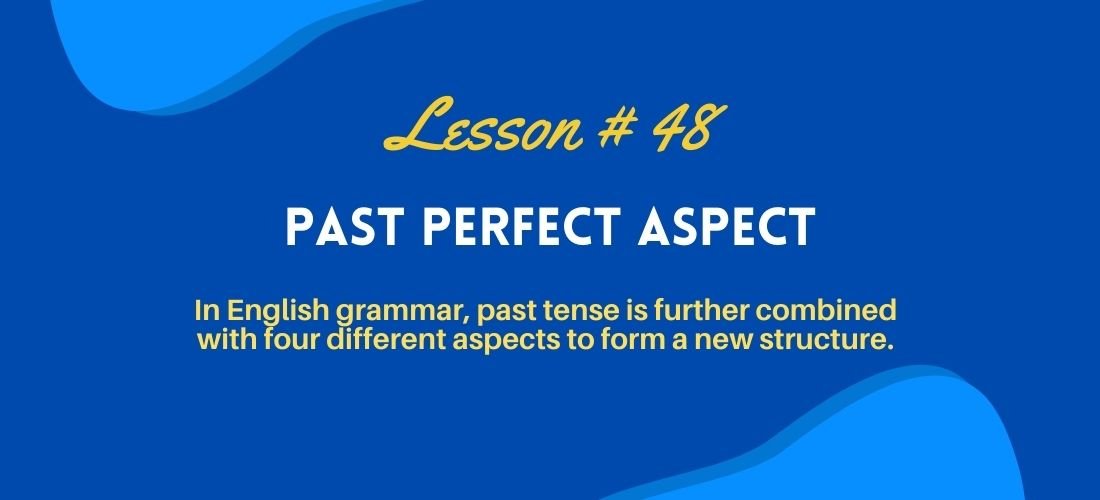Past Perfect Aspect

Past Perfect Aspect
In English grammar, past tense is further combined with four different aspects to form a new structure. Such aspects are:
- Past simple aspect
- Past continuous / Progressive aspect.
- Past perfect aspect
- Past perfect continuous aspect.
Most people consider these aspects as individual tenses of verbs, but aspects are the combination of past tense and aspects.
Tenses are a class, which expresses the time within the moment of speaking. Aspects are a subcategory of tenses that refers to the flow of time within a particular tense.
In this lesson, you are going to learn Past perfect Aspect, its formation, and uses.
What is Past Perfect Aspect?
The past perfect aspect is one of the most misunderstood and wrongly used aspects of simple past tense. People use it to express the work that has been completed a long time ago in the past. But that’s not correct.
The past perfect aspect describes those actions that took place before another action in the past. It is also used to express something that took place before a specific time in the past.
Or you can simply think of it as a way to make it clear that one thing happened before another thing in the past. The sequence of the event doesn’t matter at all because the aspect makes it clear.
Example:
- I had met betty before class started.
- My flight had left before I reached the airport.
The past perfect aspect can be used in many ways, which will be discussed later in this lesson.
Formation of the Past Perfect Aspect
The formation of the past perfect aspect is a combination of two parts of English grammar. It is formed by using the past tense of the verb "to have," which is had and past participle form of the main verb.
Past participle form of the main verb is formed by adding -d or -ed to the verb's base form. Example:
- Receive = received
- Play = played
- Laugh = laughed
But things get a bit changed in the case of irregular verbs. The past participle form of such verbs is the same as the base form of the verbs.
Example:
- Built= built
- Beat = beat
Positive / Affirmative Sentences
| Subject | Auxiliary verb | Verb | Object | Punctuation |
| Subject | Had | Past participle | Object (optional) | Period (.) |
Example:
- The doctor came, but the patient had already died.
- My sister had eaten her meal before I arrived.
- Lilly had cooked dinner before I reached home.
- My friend had gotten married before January.
- I didn’t leave until my brother had given me my bag.
In the above examples, you can see that the sequence of events is not essential; where there is a past participle form of the verb, it is past perfect.
Negative Sentences
| Subject | Auxiliary verb +not | Verb | Object | Punctuation |
| Subject | Had +not | Past participle | Object (optional) | Period (.) |
Example:
- The doctor came, and the patient had not died.
- My sister had not eaten her meal before I arrived.
- Lilly had non cooked dinner before I reached home.
- My friend had not gotten married last month.
- I didn’t leave until my brother had not given me my bag.
Interrogative Sentences
| Auxiliary verb | Subject | Verb | Object | Punctuation |
| Had | Subject | Past participle | Object (optional) | Question mark (?) |
Example:
- Had the patient died before the doctor came?
- Had Lilly cooked dinner before I reached home?
- Had you prepared the meal before my friend arrived?
Uses of Past Perfect Aspect
There are many uses of the past perfect aspect of English Grammar. It is appropriate to use them in the following ways.
To show one thing happened before another thing in the past.
The past perfect aspect describes those events that took place before another event in the past.
Note: The sequence of events doesn’t matter here.
Example:
- I failed the exam because I had not studied for it.
- Zenda didn’t leave my office until I had asked him to leave.
- Had you ever eaten Thai food before you moved to Thailand?
- Charles had never been to Dubai before he got his new job.
To show something happened before some specific time in the past.
Another important use of the past perfect aspect is that it expresses the idea that something took place before some specific time in the past. It is almost like the first use of past perfect aspects, but the event is expressed concerning sometime in later past.
Example:
- I had opened my saloon before 2009
- Had you ever played football before last night?
- She had fallen asleep before 12 o’clock.
- My friend had gotten engaged last month.
Reported speech
Besides expressing an event that happened in the later past, the past perfect aspect can also be used in reported speech.
Example:
- My mother asked if I had packed my bag.
- Henry asked if I had seen his kitten.
- The principal had said it would be a lovely event.
- My friend asked if I had received the parcel.
Dissatisfaction with the past.
Past perfect aspect can be used to express dissatisfaction with past events.
Example:
- I wished I had gone to America with my fiancé.
- She wished she had bought another dress like that.
- We wished we had stayed together.
Conclusion
Learning past perfect aspect should be of utmost preference for the students as it can be used in many ways. The past perfect aspect's primary use is to express actions in the later past. You don't need to remember the events every time because past perfect expresses which event took place first.


